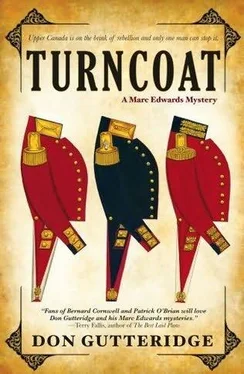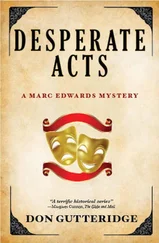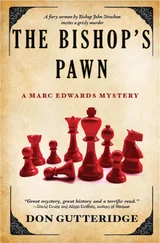Don Gutteridge - Turncoat
Здесь есть возможность читать онлайн «Don Gutteridge - Turncoat» весь текст электронной книги совершенно бесплатно (целиком полную версию без сокращений). В некоторых случаях можно слушать аудио, скачать через торрент в формате fb2 и присутствует краткое содержание. Год выпуска: 2003, Издательство: Simon & Schuster, Жанр: Исторический детектив, на английском языке. Описание произведения, (предисловие) а так же отзывы посетителей доступны на портале библиотеки ЛибКат.
- Название:Turncoat
- Автор:
- Издательство:Simon & Schuster
- Жанр:
- Год:2003
- ISBN:нет данных
- Рейтинг книги:4 / 5. Голосов: 1
-
Избранное:Добавить в избранное
- Отзывы:
-
Ваша оценка:
- 80
- 1
- 2
- 3
- 4
- 5
Turncoat: краткое содержание, описание и аннотация
Предлагаем к чтению аннотацию, описание, краткое содержание или предисловие (зависит от того, что написал сам автор книги «Turncoat»). Если вы не нашли необходимую информацию о книге — напишите в комментариях, мы постараемся отыскать её.
Turncoat — читать онлайн бесплатно полную книгу (весь текст) целиком
Ниже представлен текст книги, разбитый по страницам. Система сохранения места последней прочитанной страницы, позволяет с удобством читать онлайн бесплатно книгу «Turncoat», без необходимости каждый раз заново искать на чём Вы остановились. Поставьте закладку, и сможете в любой момент перейти на страницу, на которой закончили чтение.
Интервал:
Закладка:
“It would,” Beth said, her gaze upon the stump-scarred field in front of them, “if we owned the land next to it.”
“Where we’ve been walking is your property line, then?”
Beth murmured assent. “This was the last of our fields to be cleared. We worked on it all one summer and fall. It was the last thing Jess and I did together.”
Marc offered his arm in a comforting gesture. She did not lean upon it, but he could feel the pressure of her fingers and found it pleasantly disconcerting.
“From what you’ve just told me and from what I’ve seen of your livestock, you appear to have a prospering operation here.”
“It must look that way now,” she said, staring ahead. “The land was cheap so long as we cleared our quota and did our bit on the roads. The mortgage was mostly for the new barn, the cows and pigs, and some machinery that needed replacin’. We even had a team of oxen once.”
“Surely two or three good crops would have seen you solvent,” Marc said, as if he actually knew what he was talking about.
“True. But just as we needed them, as I said earlier, the drought struck.”
“But you’ve got a creek over there twice the size of most rivers in England!”
“I’m not talkin’ about the kind of drought you get in a desert or the kind that drove Joseph into Egypt. It only takes three or four weeks of little or no rain in June or July to weaken a crop. The thistles and blight get in, and the kernels shrivel up so you’re lucky to get ten bushels to the acre.”
“And that happened three summers ago?”
“And the summer before last, too. If you look back towards the barn from this high point where we’re standin’, you can see that the main section of growing land is very low. In the spring, it’s actually swampy, and difficult to plough and seed. We had two wet springs in a row.”
She said this as if rain and drought were the whims of a fate determined to tease and madden, the kind that brought plagues to the pharaoh and mindless ordeals to Job.
“The squire next to us back home had swamp ground like that, and he drained it with tile,” Marc said.
“But we don’t own the land next to the creek,” Beth said.
“But the creek is right there,” Marc persisted. “There’s nothing but bush on either side of it, no one is using it. It’s the same creek that drives Hatch’s mill and feeds half the wells of the township.” He was trying to keep the note of impatience out of his voice, any sense that he was instructing the naive or the unreasonably discouraged. “Nobody’d give a tinker’s dam if you drained your swamp into it or drew water out of it for irrigation. Hatch says a quarter of the farmers here are still squatters, and no one pays the slightest bit of attention.”
“That’s exactly how Jess used to talk,” Beth said. She turned and trod through the snow towards Crawford Creek. Marc floundered behind her. When he caught up, she gestured towards the frozen ribbon of water and the hardwood forest fringing its banks.
“Under those trees is prime farmland, rich soil, good drainage, a sugar maple woodlot, shade to protect the cattle …”
“You couldn’t afford to buy it? Not even the part of it that includes the creek on this side?” Marc’s eyes followed what he could now see would be the unalterable survey line that made every farm a rectangle, or set of contiguous rectangles, regardless of topographical caprice or nuance of Nature. The bow in Crawford Creek took it away from the straight boundary line that marked the western limit of the Smallman farm, when the curve of the creek itself cried out to be the natural border between the adjacent properties, assuring each a precious share of the creek’s water.
“We couldn’t buy it,” Beth said, “even if we had the money.”
Before he asked why, Marc had to suppress the unsettling thought that Joshua Smallman had been a wealthy man by provincial standards, having established his lucrative business on “fashionable” King Street and paid off his son’s mortgage, and that his daughter-in-law, so recently restored to his affection, would surely inherit whatever remained.
“What you see over there,” Beth said, “and all along this side of the creek, is a lot owned by the Crown. If and when the government ever decides to sell it, the proceeds will go to the clergy.”
Light dawned. Inwardly Marc winced at his own obtuseness, his failure to see how Beth Smallman had been leading him patiently towards this conclusion. The Clergy Reserves had topped every list of grievances headlined in Mackenzie’s Colonial Advocate . This was a phrase flung like a goad against the worthies of the province and the governor’s appointed Legislative Council.
“Ah. . yes. Every seventh lot to be reserved for the use and maintenance of the Anglican clergy,” Marc said, the legalese slipping easily off the tongue. “But surely the assignment of such lots is not random and self-defeating. Surely both parties, the Church of England and the farmers, stand to gain by the rational allotment and sale of such reserve lands.”
“The surveyors laid out these lots ten years ago and applied the grid plan they’d been given by the Executive Council. It’s the same for every township in the province. The disposition of lots is decided in advance. What’s actually on them or not on them is irrelevant.”
“That’s preposterous!”
“Mr. Mackenzie himself used that very word.”
“Even so, can no one buy that lot over there?”
“Clergy Reserve lots are bought and sold all the time. Archdeacon Strachan and his cronies in the Council trade them-like marbles. But only when the value’s been raised or it appears convenient or necessary to their interests. That one over there will be sold when all the property ’round it is cleared and improved and a concession road cut out to the north of it. It’ll be worth ten times what it is now-to someone. Our farm and it would make a natural and very profitable pair.”
“But couldn’t you and your husband have run your tile down to the creek and set up some irrigation pipes in the interim? You could’ve put a squatter’s shack on that piece by the bank, for God’s sake!”
“We could have. But what’s to stop the leaders of the Anglican Church with influence in the governor’s Executive Council from suddenly decidin’ to sell that lot to one of their friends, and that friend then comin’ in and rippin’ up our tile-leavin’ us high and dry like we were in the first place? Not a thing.”
“They don’t have to sell at public auction?”
“Not if it doesn’t please them. And don’t forget, Jess and me were Reformers through and through.”
Recalling Joshua Smallman’s friendship with Sir John Colborne, Marc said, “But perhaps your father-in-law could have petitioned the Executive Council on your behalf?”
“He didn’t believe in that kind of shady dealing,” she replied, with more pride than regret. “He was too honourable.”
“But you’re not suggesting that the government would let politics influence the conduct of its responsibilities?”
The ingenuousness of the question surprised and amused Beth Smallman, but she suppressed a laugh.
“All this has been set out in the Report on Grievances that Mackenzie sent across to Lord Glenelg?” Marc continued.
“The Seventh Report on Grievances.”
They walked slowly back towards the barn, Beth ahead, Marc behind. At the point where the path dipped south towards the mill property (that, as chance would have it, straddled the creek down its full length), Marc prepared to take his leave. He took Beth’s hand and brought her mittened fingers to his lips, a gesture ingrained by long habit and prompted now by something more than courtesy.
Читать дальшеИнтервал:
Закладка:
Похожие книги на «Turncoat»
Представляем Вашему вниманию похожие книги на «Turncoat» списком для выбора. Мы отобрали схожую по названию и смыслу литературу в надежде предоставить читателям больше вариантов отыскать новые, интересные, ещё непрочитанные произведения.
Обсуждение, отзывы о книге «Turncoat» и просто собственные мнения читателей. Оставьте ваши комментарии, напишите, что Вы думаете о произведении, его смысле или главных героях. Укажите что конкретно понравилось, а что нет, и почему Вы так считаете.












